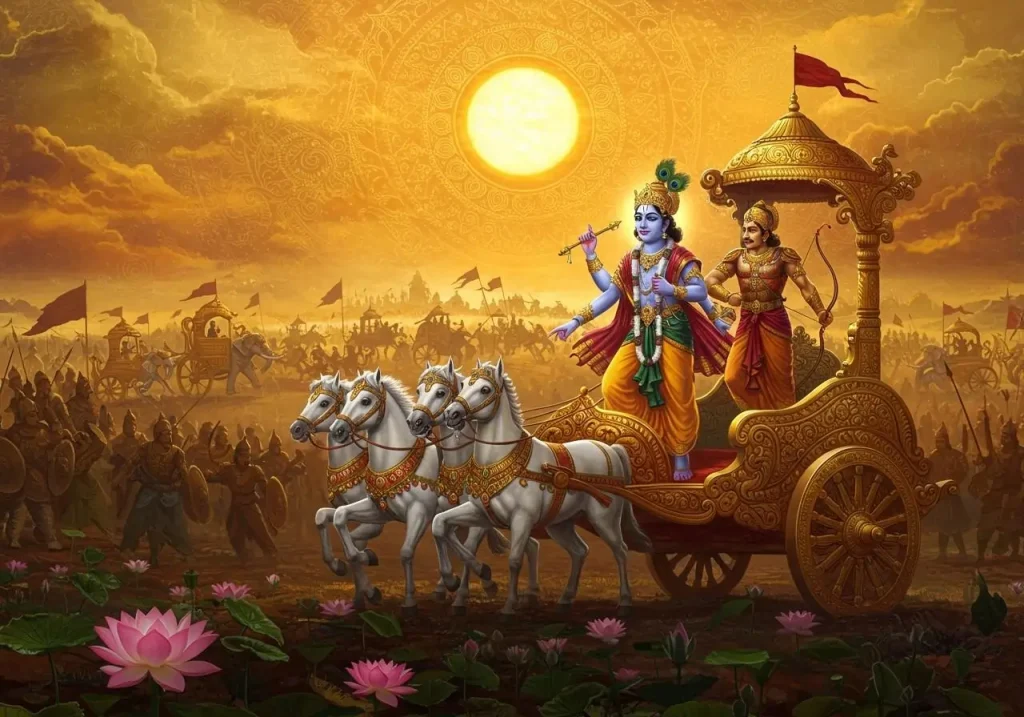
“Explore the Mahabharata’s designation as the ‘Fifth Veda‘ in this humorous take on its significance in understanding Dharma, featuring epic tales, divine interventions, and timeless wisdom.”
When you think of ancient Indian scriptures, the Vedas might come to mind—those profound texts filled with hymns, rituals, and philosophical musings. But then there’s the Mahabharata, often dubbed the “Fifth Veda.” Why? Because sometimes, understanding Dharma requires a bit of drama.
The Vedas: The Original Box Set
Before streaming services, ancient sages had the Vedas:
- Rigveda: The OG playlist of hymns.
- Yajurveda: The “how-to” guide for rituals.
- Samaveda: The musical remix of Rigveda.
- Atharvaveda: The eclectic collection—think spells, charms, and home remedies.
But then came the Mahabharata, the epic that said, “Hold my Soma.”
Mahabharata: The Fifth Veda?
The Mahabharata isn’t just a story; it’s an experience. Attributed to Sage Vyasa, this epic encompasses over 100,000 verses, making it longer than the Iliad and the Odyssey combined.
It’s like the ancient version of a binge-worthy series, complete with plot twists, moral dilemmas, and character arcs that would make modern writers jealous.
But why is it called the Fifth Veda? Because it democratizes knowledge. While the original Vedas were primarily accessible to the priestly class, the Mahabharata brings profound philosophical discussions to the masses, weaving them into captivating narratives. It’s the ancient equivalent of turning a dense textbook into a gripping novel.
Dharma: The Ultimate Plot Device
At its core, the Mahabharata is an exploration of Dharma—righteousness, duty, and the moral order. But instead of dry lectures, it presents Dharma through complex characters and situations:
- Bhishma: The granduncle torn between loyalty and justice.
- Arjuna: The warrior facing a moral crisis on the battlefield.
- Draupadi: The queen who challenges societal norms and demands justice.
Through their stories, readers grapple with questions that remain relevant:
- Is it better to uphold a vow or adapt to circumstances?
- When does duty to family override duty to society?
- How do personal desires align with the greater good?
Vyasa: The Sage with a Pen
Sage Vyasa, the author of the Mahabharata, wasn’t just a writer; he was a visionary. By compiling the Vedas and penning the Mahabharata, he bridged the gap between esoteric knowledge and everyday life. His work ensures that profound philosophical concepts are accessible, relatable, and, dare we say, entertaining.
Why the Mahabharata Still Matters
In today’s world of moral ambiguities and complex choices, the Mahabharata offers timeless insights:
- Complex Characters: No one is purely good or evil. Each character embodies virtues and flaws, reflecting the human condition.
- Moral Dilemmas: The epic doesn’t provide clear-cut answers but encourages introspection and critical thinking.
- Universal Themes: Love, power, jealousy, sacrifice—the Mahabharata covers it all, making it perpetually relevant.
Conclusion: Embracing the Fifth Veda
The Mahabharata’s designation as the Fifth Veda isn’t just about its length or literary prowess. It’s about its ability to convey profound truths through engaging narratives. It’s a testament to the idea that stories can be powerful vehicles for wisdom.
So, the next time you’re faced with a moral quandary or just need some epic storytelling, turn to the Mahabharata. After all, where else can you find divine discourses, epic battles, and life lessons all rolled into one?

